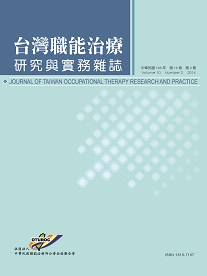Journal of Taiwan Occupational Therapy Research and Practice

半年刊,正常發行
目的:精神障礙者在求職中的操作表現或執行日常生活的功能上,其負重能力之好壞,常扮演一重要之角色。本研究之目的為評估精障者之負重能力與再測信度,並與正常人比較結果之差異,藉此了解精神障礙者之功能性體能現況。方法:共有56位精神障礙者(男性27位,女性29位,平均為29.52歲)與48位正常人(男性21位,女性27位,平均為23.50歲),參加本次之研究。所有受試者均分別接受兩次且間隔兩星期之負重能力評量。結果:結果顯示本研究負重能力之兩星期再測信度良好,其中精神障礙組之再測相關係數為0.633到0.944;而正常人組之再測相關係數為0.805到0.903,兩組均呈現良好之再測信度,但精障者組之負重能力在本研究中之表現比正常人組差。結論:本研究之負重能力評量為一信度佳之評估工具,可應用於精障者與正常人。而精障者的提舉與抬舉等負重能力較差之表現,可供精神復健專業人員參考,在未來之復健治療或職業訓練時,增加體能活動或負重訓練,以強化精障者的職場與日常生活功能之表現。
The purposes of this study are to assess the weight capacity of clients with psychosocial disabilities and to exam the test-retest reliability of the weight capacity assessment. Methods: There were 56 psychiatric clients and 48 normal adults in this study. All participants completed the weight capacity assessment twice within a two-week interval. Results: The results of the weight capacity assessment of all participants were discussed. The test-retest reliability correlation in a two-week interval for psychiatric clients in the weight capacity assessment ranged from .633 to .944. Conclusions: The weight capacity assessment is a good reliable tool for psychiatric clients and normal population. We can apply the results of this study in the future vocational rehabilitation programs and to improve the work performance daily life for clients with psychiatric disabilities.












